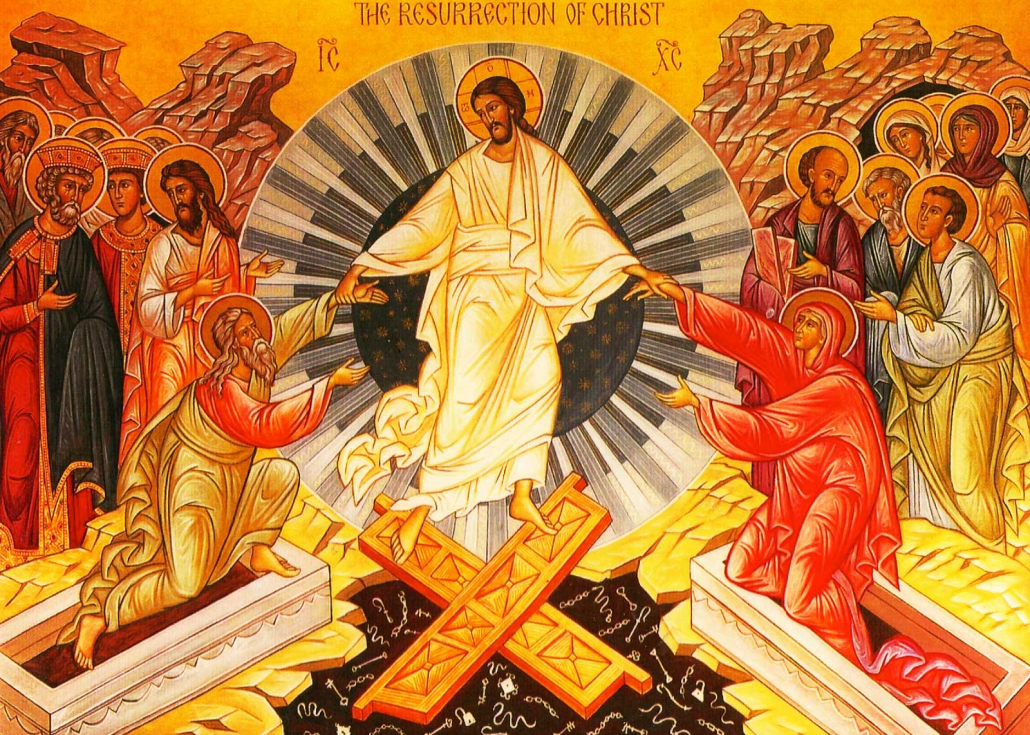Image: Orthodox Icon: The harrowing of hell.
‘Return to the world’
Andrew Collis
Easter Day, Year C
Luke 24:1-12
Our gospel traces a movement of faith from loving kindness to emptiness, encounter with strangers/angels, then memory, testimony, disbelief, action, wonder/amazement …
In evangelical circles, theology (talk about God) is often conflated with ontology (talk about being). The philosopher Martin Heidegger called this “onto-theology” (his own work focused on being, on authentic existence), saying that if he were to write a theology it would not feature the word “being” at all.
What did he mean? God is not a being, certainly … but more than this …
Heidegger, like Søren Kierkegaard before him and Emmanuel Levinas after, believed in God as a symbol of love and the possibility of good, not a symbol of being.
The bigger Easter story (prefigured by psalms 22 and 31) includes a cry of abandonment, letting go belief in God as “superintendent of the universe” (Richard Kearney) – a God meting out rewards and punishments – and a confession of faith, new faith, faith after faith – a commending/committing of spirit, self-giving … contact with the world in ethical terms – in terms of right relationship, solidarity, freedom …
The ethical relation comes first. Goodness inspires images of the holy or sacred, images of G(o)od.
Religion/wisdom entails heeding the call to attend and accompany, to forgive and make safe, heeding the call for help – goodness responding to goodness, the harrowing of hell (as the Icon shows). Religion is a practice, a way to live with others in a world both beautiful and broken (Margaret Mayman) …
What is the message of Easter? We might approach the question with appreciation of the gospels as responses to trauma.
The story of Jesus embodies concerns common to all the Abrahamic religions – ethical concerns – namely, faithfulness to one another in the world, openness to the stranger, including the Holy Stranger (wholly different from us, more than we know).
The crucifixion shows the all-too familiar – hostile religion, state-sanctioned violence. There are cries of distress, scattered and frightened disciples, loss of faith and hope.
The story might easily conclude in bitterness, desires for vengeance or acceptance of tyranny – power as power over others.
The gospel accounts of the risen Christ, however, trace a certain recovery and return to the world – a return to faith after faith, hope after hope.
Although the accounts differ – each gospel tells its own story – there is an underlying pattern. Christ is encountered (again, anew) in sharing food, exchanging signs of peace, sensitive and loving touch – tact, savvy.
Hospitality is the key – openness to the Holy Stranger as last, little, least.
Easter faith, then, means coming to choose hospitality over hostility (ever a risk), working to amplify hospitable voices, joining with others (confused, traumatised) to practise the art of welcome, nourishment, care.
The message of Easter is thoroughly ethical as well as engaging poetic powers – songs and stories inspired and inspiring. It also means coming to experience the world itself in new and wonderful ways. Hence, the various modes and layers of religion.
Just as Christ, in the gospels, returns to the world of gardens and community gatherings, cross-cultural friendships and courage for nonviolent action, we too are re-called – gently, insistently – to a world in need, in pain.
Another story in Luke 24 tells of dejected disciples walking away from Jerusalem. They are joined by a stranger with whom they share their deep concerns. In a village called Emmaus they invite the stranger to stay with them. There, at a table in an inn, as the stranger breaks and shares bread, their eyes are opened to recognise the risen Christ. In that moment, we read, the Holy Stranger disappears.
Once revealed, all is changed. Gerard Manley Hopkins writes: “Christ plays in ten thousand places,/ Lovely in limbs, and lovely in eyes not his …” We might even come to understand ourselves as holy strangers, hosts and guests, the body of Christ. Amen.




